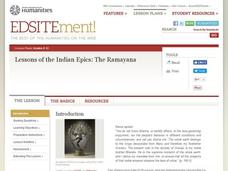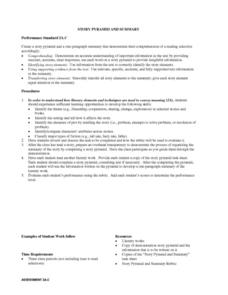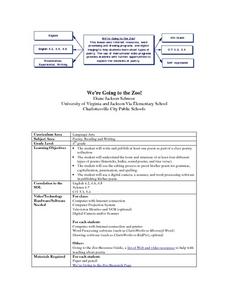Curated OER
Lessons of the Indian Epics: The Ramayana
Students read a version of Ramayana and explore the elements of the epic hero cycle. In this Ramayana analysis lesson, students retell the basic narrative of the Ramayana and identify the main characters. Students identify elements of...
Curated OER
Screening the Silver Screen
Learners write New York Times Movie Guide Reviews using descriptive and persuasive language.
Curated OER
Thank You Ma'am Langston Hughes Process of Discovering Theme
Students identify the elements of the plot and identify and express this story?????™s theme.
Curated OER
Anticipatory Set Picture Walk
The teacher models a Picture Walk by using a "think aloud" method while reading a picture book to the class. On the second day, 3rd graders use a worksheet as a guide for a second picture walk. This time, students complete the "think...
Curated OER
Interior Design - Space Unit
High schoolers review the elements of design with a focus on space. During a lecture, they complete a listening guide and ask any questions they might have. Individually, they are given paper to design the classroom in regards to...
Curated OER
THE DIVERSITY OF ARCHITECTURE: HOW HEALTHY IS MY NEIGHBORHOOD?
Students observe and investigate, on a walking tour, what elements create a healthy neighborhood. They examine the significance of the relationship of the built environment as well as the important details of architecture.
Curated OER
Bob Marley - Legend Episode #3 - Lesson 1
Young scholars recognize and describe elements of Bob Marley's life that influenced his song writing as evidenced in the song "No Woman No Cry". They identify the elements of music characteristic of Reggae.
Curated OER
Story Pyramid and Summary
Students read a short selection of a story individually or as a class. On their own, they create a story pyramid for the selection and write a one page summary. They use text from the story for their supporting details. To end the...
Curated OER
Using Graphic Organizers to Generate Genre Definitions
Students listen to or read a variety of stories and then work individually or in groups to complete graphic organizers that will help them focus on elements within different types of stories. They write definitions for a variety of story...
Curated OER
Chinese Zodiac
Fifth graders identify the basic elements of a narrative story, such as the beginning, middle, and the end; to analyze the character traits in the story to write a summary using the 5 Ws and How chart included; through sample stories...
Curated OER
It's a Mystery to Me
Students read a variety of mysteries to improve their reading and comprehension skills. Using a worksheet, they define and practice using new vocabulary. In groups, they read stories from Poe and Sir Arthur Conan Doyle and write an...
Curated OER
What's Your Symbol?
Sixth graders investigate how colors, objects and geometric shapes have been used symbolically in art during specific time periods. They use this information to create symbolic artwork and write a descriptive/informational piece...
Curated OER
We Are a Comm-un-it-y. I've Got All My Classmates with Me-Part I
Students investigate the meaning of community. In this community lesson, students look at the concepts of civic engagement, civic responsibility, and common good. They determine how a classroom is a community and the need for having...
Curated OER
Being in the Noh: An Introduction to Japanese Noh Plays
Students analyze the conventions used in Noh plays and write an introduction to a Noh play of their own. In this Noh play lesson, students identify the conventions of the Noh form and analyze the realizations the main character achieves....
Curated OER
Loving Literature
First graders, after having "Are You My Mother?" by P.D. Eastman read to them, participate in group discussions or independentally work to analyze a spreadsheet to identify essential elements in the story and graph their data. In...
Curated OER
Our Illuminated Alphabet TESTing
Students practice writing letters of the alphabet and explore how decorated letters can be used to convey stories or symbolic ideas. They create an "illuminated" alphabet in which each letter conveys concepts of home and family.
Curated OER
City People, City Stories
Young scholars create fictional inhabitants to scale for a place called 'Box City'. They develop stories and personalities to go with the created people, share the stories with the class and write a newspaper for their city.
Curated OER
We're Going to the Zoo!
Young scholars write and publish a poem as part of a class poetry collection after analyzing the poetic structures of haiku, limericks, sound poems and free verse. After viewing a multimedia demonstration of the poetic structures, and...
Curated OER
Our Illuminated Alphabet
Young scholars write letters of the alphabet and explore how decorated letters can be used to convey stories or symbolic ideas. In this decorating alphabet lesson, students create an “illuminated” alphabet in which each letter conveys...
Curated OER
Tessellation Design And Construction
Students study the basic elements and concepts of the visual art's perceptual component - such as shape, line and color. They create tessellations that foster problem solving and reflective thinking.
Curated OER
Music from a Place Called Half Moon
Students read the novel, Music from a Place Called Half Moon. They are assigned chapters to analyze for literary elements and to assign titles to the book chapters.
Curated OER
Circle Art
Learners investigate two and three dimensional shapes. In this geometry lesson, students write equations of circles and graph them correctly. They create pictures using circles.
Curated OER
Palette Knife Painting Inspired by the Works of Brian Rutenburg
Students explore the works of Brian Rutenburg. In this art lesson, students create a work of art using acrylic paint and palette knives inspired by the works of Rutenburg. Students write about their artwork.
Curated OER
Alberta And Saskatchwan: the View in 1905
Students analyze the differences between maps 1905 and current maps of Alberta and Saskatchewan. They use maps from the Canadian Council for Geographic Education to complete a guided inquiry. This lesson also has many extension activities.

























